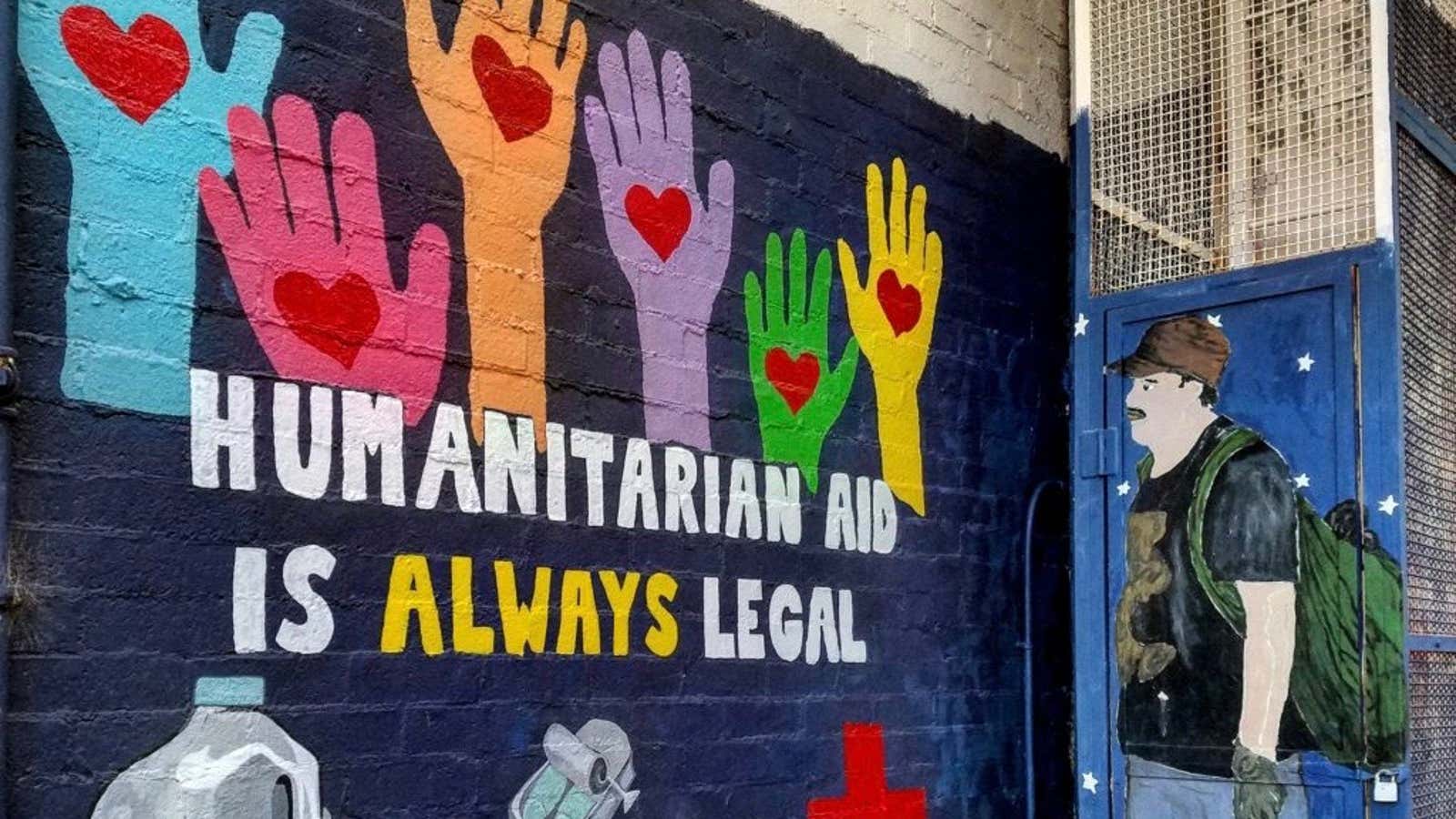Scott Warren is active in a Unitarian Universalist faith-based Arizona humanitarian aid group called No More Deaths. His beliefs compel him to help people in need, he argues—and that includes helping migrants who cross the US-Mexico border into Arizona, and make their way to “The Barn,” a private building in the desert that serves as a base camp for the aid group, where Warren was arrested in January for illegally “harboring illegal aliens.”
Warren is charged with two counts of felony harboring and one count of felony conspiracy after he helped two men who sought refuge in the Barn. The federal complaint against him states, “After finding their way to ‘the Barn,’ Warren met [the men] outside and gave them food and water for approximately three days. [One of the migrants] said that Warren took care of them in ‘the Barn’ by giving them food, water, beds and clean clothes.”
No More Deaths volunteers have, for the last thirteen years, been leaving food and water in the desert for migrants who arrive there from Mexico. The organization contends that “humanitarian aid is never a crime.” For a time, Border Patrol agents left the group’s activists unmolested.
But with the escalating crackdown on illegal immigration prompted by the Trump administration, however, agents are destroying life-saving supplies left by the group in the deadly desert. The Barn is being raided, and activists are increasingly targeted and arrested. “The targeting of our work is part of a larger governmental push to punish and abuse migrants and those who stand in solidarity with them,” No More Deaths writes on its website.
Warren argues that his faith dictates that he must assist migrants in need. One of his legal defenses is based on the Religious Freedom Restoration Act (RFRA),which protects people with sincerely held religious beliefs, stating that the “Government shall not substantially burden a person’s exercise of religion even if the burden results from a rule of general applicability.” In other words, there are exceptions to the laws, when that law violates the moral code and religious convictions of a person with true faith.
In July, attorney general Jeff Sessions called religion the “first freedom” in a July speech. US president Donald Trump and his Supreme Court picks have also championed the law’s protections for the faithful. Most notably, Neil Gorsuch in his controversial concurrence in the 2013 case Hobby Lobby v. Sebelius, found that the chain of crafts stores could deny employees health benefits associated with contraception despite a legal mandate to offer those benefits, because it offended the chain owners’ Christian faith. “All of us must answer for ourselves whether and to what degree we are willing to be involved in the wrongdoing of others,” Gorsuch wrote.
Gorsuch pointed out that though some may even find certain beliefs offensive, if they are sincerely held and based on faith, the RFRA applies. The Act doesn’t just apply to protect popular religious beliefs, the judge noted. “It does perhaps its most important work in protecting unpopular religious beliefs, vindicating this nation’s long-held aspiration to serve as a refuge of religious tolerance,” he wrote.
But just how far does the Trump administration’s protection of the Christian faithful really go?
Critics contend that the administration has a double standard for religious freedom. “There’s a public face of this government, which is very protective of religious liberty, and then the real work they’re doing is only protecting the religious liberty rights of those who are religious conservatives, not of religious progressives,” Katherine Franke, director of the Public Rights/Private Conscience Project at Columbia Law School, tells KQED. Franke and other law professors filed an amicus brief on behalf of Warren, explaining to the Arizona districts court how the statute applies to his case.
Similarly, Daniel Mach, director of the ACLU’s program on freedom of religion and belief, tells KQED that the Trump administration’s application of the RFRA is “selective and distorted,” ultimately only benefitting those who agree with the administration’s positions and not truly protective of the faithful. ”It supports an unfounded, unprecedented religious license to discriminate; and at the same, the administration is indifferent or outright hostile to faiths and religious individuals with which it disagrees.”
At a court hearing in May on Warren’s motion to dismiss the government’s case based on the RFRA, he spoke about his religious beliefs. Warren said his faith dictates that he assist anyone in need and that he treat others as he would wish to be treated himself. The Department of Justice countered that the law doesn’t burden Warren’s faith, claiming that the migrants he assisted weren’t really in distress. The DOJ also argues that his faith doesn’t require that he aid people evading law enforcement. The judge denied Warren’s motion to dismiss the charges.
But the religious freedom claim will come up again when Warren’s case goes to trial in November. And the trial raises the very likely specter that an administration that has made much ado about respecting faith will find itself arguing that the government’s laws trump the word of God.
Clarification: A previous version of this article stated that Warren is a Unitarian Universalist. He is religious but he is not a member of that church.
